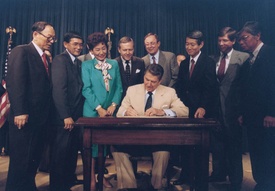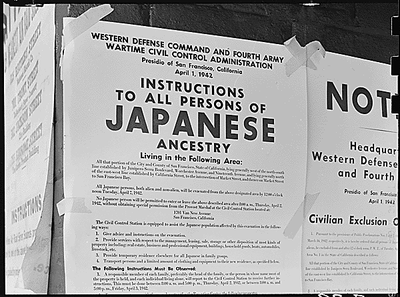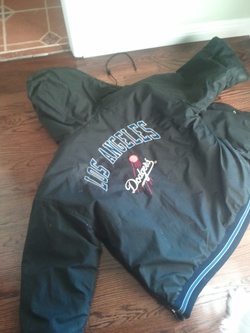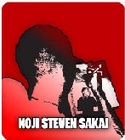2012 marks the 70th anniversary of the signing of Executive Order 9066. For those of you who don’t know, 9066 was the order that eventually led to the unconstitutional incarceration of Japanese Americans during World War II. It was signed by President Franklin Delano Roosevelt on February 19, 1942. Here’s a quote from the order:
“…from which any or all persons may be excluded, and with respect to which, the right of any person to enter, remain in, or leave shall be subject to whatever restrictions the Secretary of War or the appropriate Military Commander may impose in his discretion.” (Read the entire Executive Order.)
In other words, people can be moved if the government/military believes it necessary. It is important to note that although the order does not refer to Japanese/Japanese Americans specifically, everyone knew that’s who it was meant for. This is in spite of the fact that the executive branch of the government was made aware (in what became known as the Munson Report) that there was no military justification or security danger within the Japanese American community.

Ronald Reagan signing Japanese reparations bill in 1988 (Courtesy of the Ronald Reagan Presidential library)
However, I choose to celebrate this auspicious anniversary be remembering the Civil Liberties Act of 1988 and my father’s reaction to it. In the act, the United States officially apologized and gave 20 thousand dollars to all Japanese Americans who were incarcerated during Second World War. Why is this important? Because it restored the community’s faith in the government and allowed people to begin to heal—even if it was 40 years late.
My father never talked about the camps—this despite the fact that he had spent over five years of his childhood there. But I remember how happy he was when he heard about the apology and the reparations. It was the first time he told me that he had been in the camp. He couldn’t remember much (just that the food was bad) but I have come to believe that part of his not remembering was his way of unconsciously suppressing this traumatic part of his childhood.
The apology and the reparations changed everything. It made him want to find out what happened and why. He died before discovering the reasons our family was taken and moved to various camps for the entire duration of the war. I have in my adulthood discovered the family’s World War II story; you can read my five part series here.
My father’s faith in his country was rediscovered the day the Civil Liberties Act was passed. I remember him telling me that no other government would apologize to its own citizens for a wrong they committed in the past and that’s what made America so great. I don’t think I had ever seen him so proud of his country. I’m not sure I would have been so forgiving if they had done to me what they did to him but that’s not all that surprising considering my father was a much better man than me.
My dad wanted to celebrate the event with me so he told me he’d buy me anything I wanted. I eventually decided to get a Los Angeles Dodgers parka—all the cool people had it at school. I believe it cost over 100 dollars. At the time, the purchase felt extravagant and I remember thinking that we had won the lottery. And the thing is, my father’s smile every time he saw me wearing the jacket made me feel like he thought the same thing.
I still have that jacket today. It’s old (almost two decades old) but I still wear it every morning when I walk my dog (at least during the winter). And every time I put it on, I think about my father. I plan on one day giving the jacket to my son and I hope he knows that sometimes family heirlooms aren’t just jewelry or antiques but sometimes it’s an old Dodgers jacket that rights historic wrongs.
My father passed away over a decade ago but I hope on the 70th anniversary of the signing of Executive Order 9066 he can see me (from wherever he is) still wearing the jacket. If he can, I know he’s still smiling.
* This article was originally published on 8Asians.com on January 3, 2012.
© 2012 Koji Steven Sakai








